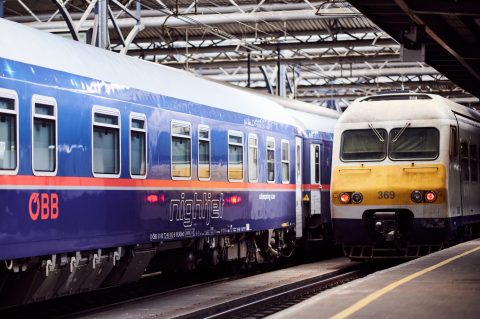Belgium to encourage night trains by covering energy and access charges in ‘European first’
To encourage railway operators to run night trains to and from Belgium, the federal government wants to cover the costs of using the rail infrastructure and energy charges. A proposal for this was submitted by the Belgian Minister of Mobility and has now been approved by the Council of Ministers.
Belgium wants to make night trains more attractive for both operators and passengers. However, many projects have been slow to get off the ground, if at all. Georges Gilkinet, the Belgian Minister for Mobility, thinks he has found a possible solution to make it more attractive for railway undertakings to run night trains in Belgium. A financial support scheme for providers of night trains with one or more stops in Belgium was approved by the Belgian Council of Ministers last week. The measure will mean that once adopted, the Belgian government will cover all costs of infrastructure access and energy for night train operations, a spokesperson of Gilkinet confirmed to RailTech.

“The success of the Nightjet, the night train between Brussels and Vienna [operated by the Austrian ÖBB], shows the potential of travelling like this between European capitals”, said Gilkinet. “This is one of the reasons why I proposed this law, which is a European first.” The Nightjet train from Brussels to Vienna started operations in 2020, and was the first sleeper train in Belgium since 17 years. Now, the federal government wants Belgium to play a leading role in the European ambition to develop more and faster international rail links between major European cities, including with night trains.
Helping night train operators to establish themselves
Many sleeper trains have disappeared from the European tracks in the last decades because of decreasing demand, but now this way of travelling experiencing a revival. However, it is not easy for railway operators to launch a night train, with services from for example new operator European Sleeper from Brussels to Prague and the Alps having to be postponed. One of the main obstacles is the fact that very little rolling stock with sleeping compartments is available.
“Rail operators need long-term prospects for launching projects and there is room for improvement in international ticketing. The aim of this legal framework and financial aid is to help operators overcome these obstacles: a reduction in their fares will therefore facilitate their economic activity and help new operators to establish themselves”, according to the Belgian ministry of mobility.
Belgium hopes other countries will follow
The plans will now be submitted for inspection by the Council of State, after which the Belgian government must approve them. The subsidy scheme will apply – on a trial basis – for the next two years. Once the plan has been approved, the government pay the fee that train operators have to pay to rail infrastructure manager Infrabel in order to run trains on the rail network. The government will also reimburse the energy costs charged to run on the network. The Belgian government has estimated 2 million euros for the aid measure.
Gillkinet: “I want to show night train operators that they are welcome in Belgium. And if this European first is a success, we hope that other Member States will follow us, so that night trains will have an even more favourable framework and fares will be even more attractive to travellers. I am very proud that Belgium is in any case playing this pioneering role”, concludes the Minister for Mobility.
This article was originally published on RailTech.com the organiser of RailTech Belgium.
morenews
First edition of RailTech Belgium opens registration
The first speakers of the conference are confirmed, among which Georges Gilkinet, Deputy Prime Minister and Minister of Mobility in Belgium, Michel Ruesen, Managing Director of the ERTMS Users Group and Thierry Vanelslander, professor at the Department of Transport and Regional Economics of the University of Antwerp. The conference topics The morning conference will look… Read more ›
Infrabel completes 12-year upgrade project of Belgian port shunting yard
The Zwankendamme bundle has ten electrified tracks, four of which are long tracks. In addition to these tracks, there is a separate bundle of 4 tracks where Infrabel customers can temporarily park their locomotives. In the past, locomotives were parked in the shunting yard, which resulted in a loss of capacity. The new infrastructure also… Read more ›
Major improvements for Brussels’ public transport infrastructure planned for 2023
The work will require 3,150 metres of track beams, 134 prefabricated track modules and more than 400 intermediate precast slabs, as well as 5,000 square metres of bricks embedded in those modules, almost 1,900 metres of drainage trenches, more than 7,500 concrete sleepers and as many thousands of accessories for fixing and protecting the tracks…. Read more ›
